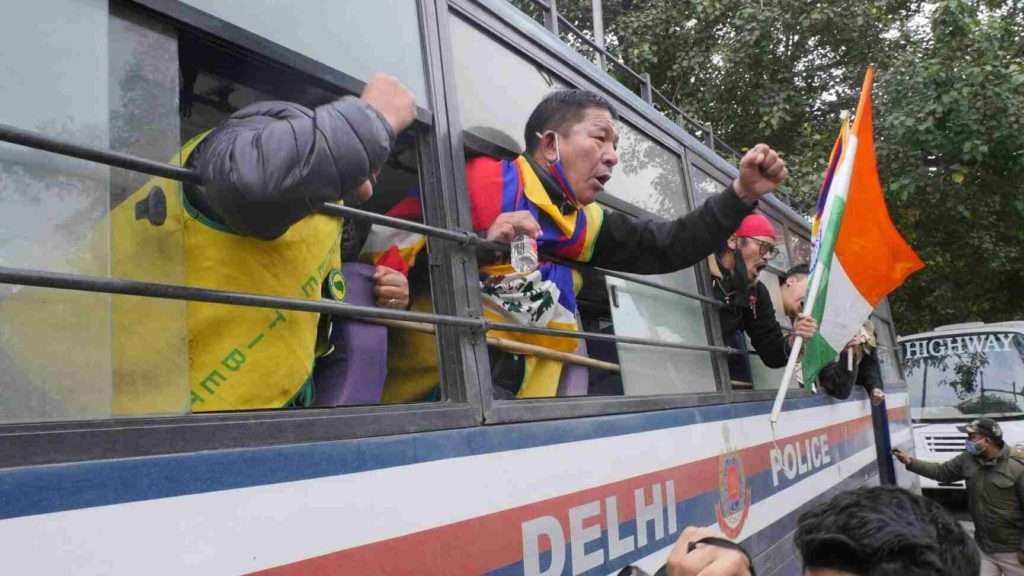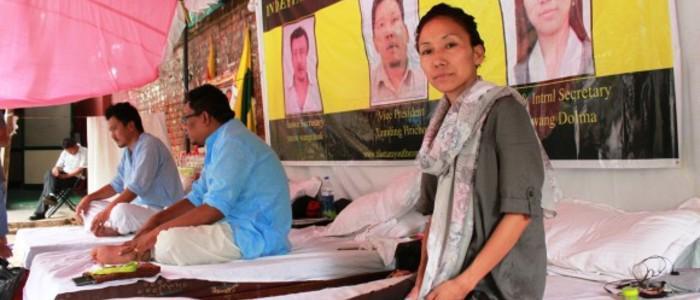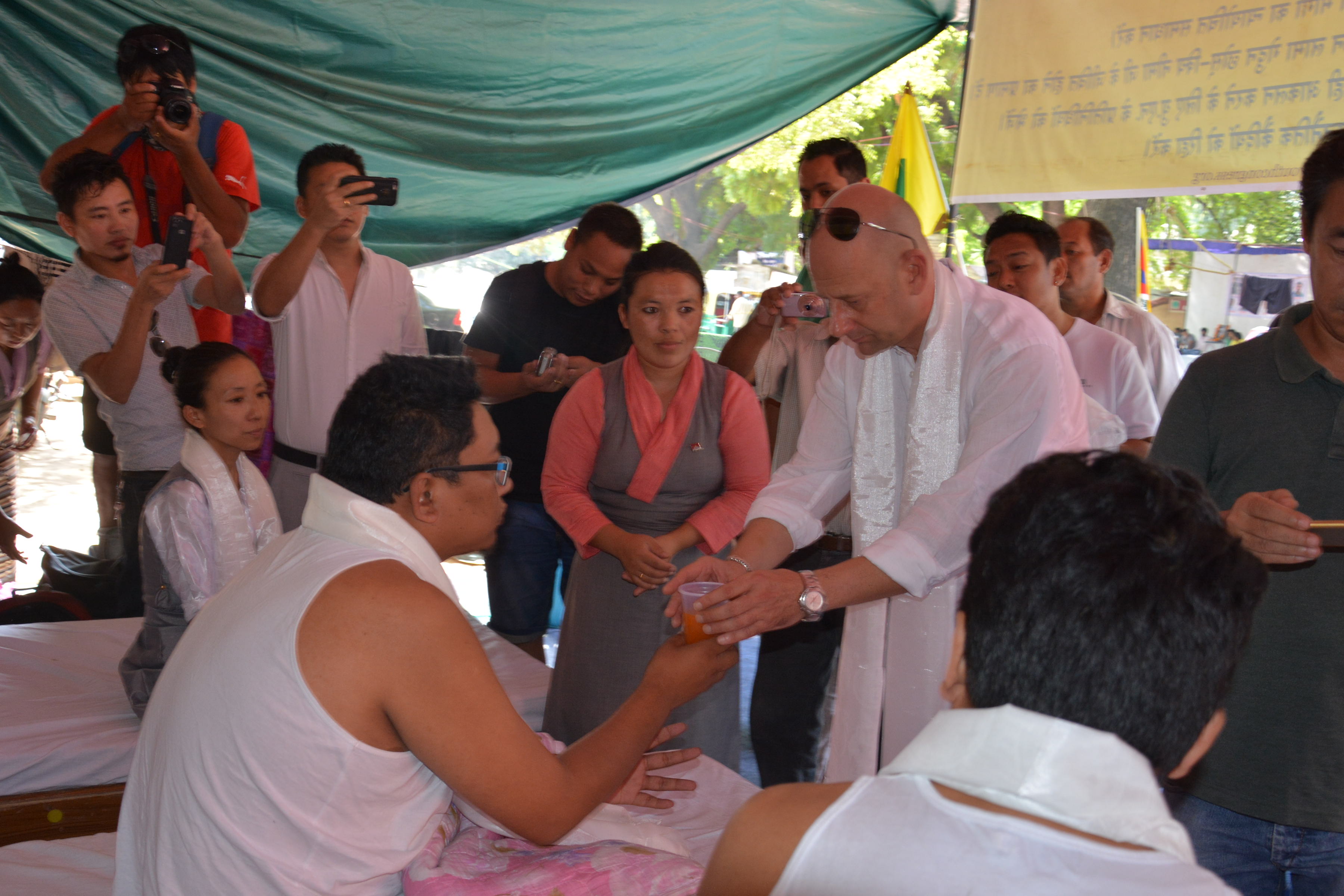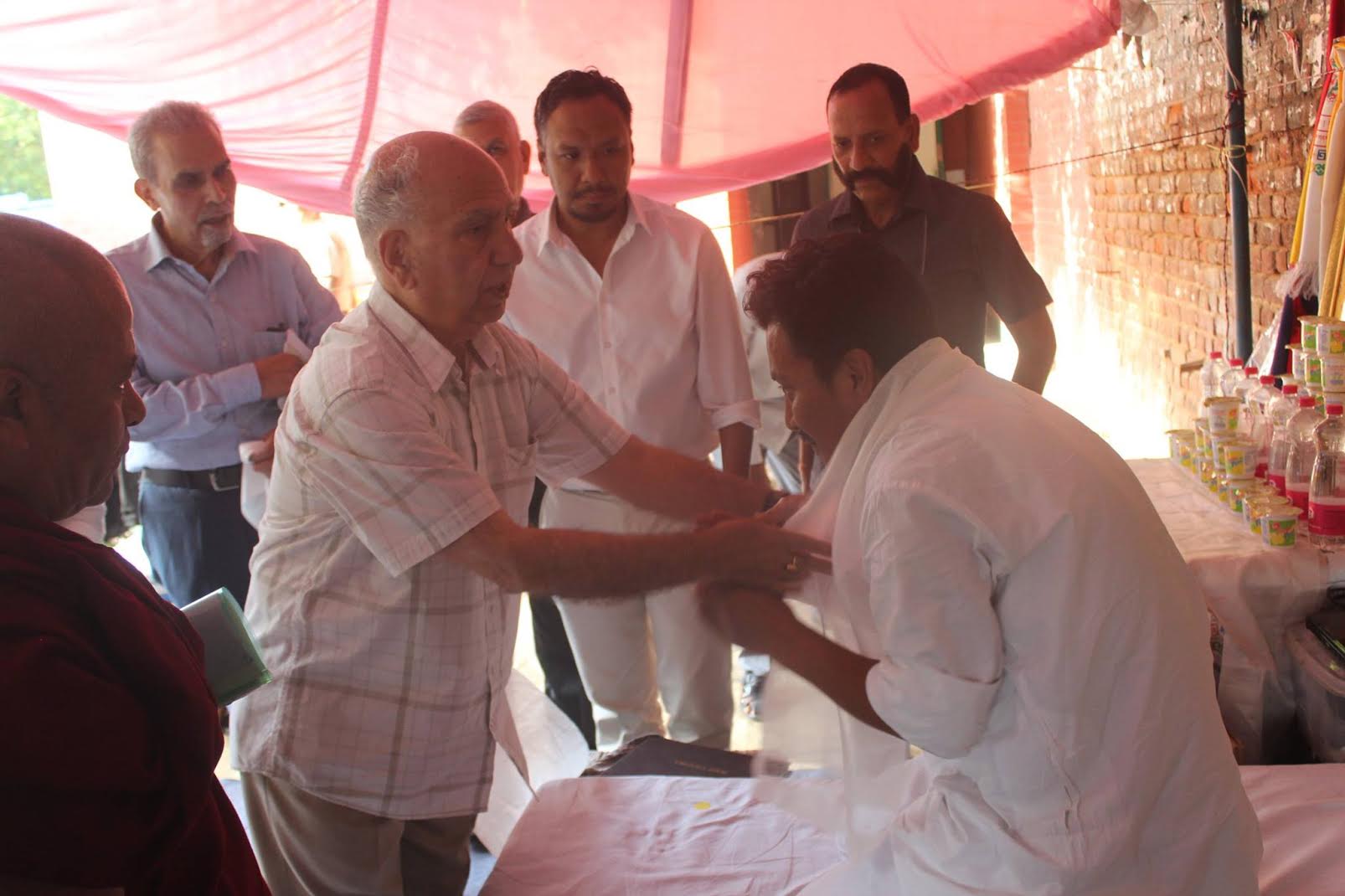Hunger Strike
Hunger Strike is a form of non-violence resistance and Tibetan Youth Congress has organized events of the Hunger strike over the past years. The hunger strike is a Mass Peoples Movement and is admittedly a desperate but a non-violent tactic by Tibetans who can see no indication that China intends to reverse its course in Tibet. Following are the events of the hunger strike organized by the Tibetan Youth Congress across the world to date.
-
- 30th August 1974 : TYC launched a “fast unto death” strike in front of the Bhutanese Mission in Delhi demanding free trial and release of 28 Tibetans including the Representatives of the Tibetan government, arrested on charges of conspiracy to kill the Bhutanese King. It was called off on the 14h day, after assurances from Indian MPs to raise the matter with the Bhutanese Government.
- 20th March 1977 : Seven Tibetans stayed on an indefinite hunger strike in front of the United Nations Information Centre in New Delhi to demand the implementation of United Nations resolutions passed on Tibet. This hunger strike was conceived at the 4th Working Committee Meeting of the Tibetan Youth Congress and ignited by the violent 10th March demonstrations in the same year. The hunger strikers received supports from various NGOs, Politicians, and civil society members. On 30th March 1977, Acharya Kirpalani broke the fast of the seven hunger strikers by offering them orange juice.
The seven hunger strikes include six males and one female.
1. Mr. Tenchoe, 41 years
2. Mr. Tenzin Tsultrim, 20 years
3. Mr. Tamdin, 30 years
4. Mr. Tsering Wangchuk, 28 years
5. Mr. Lobsang Rabten, 30 years
6. Mr. Kunchuk, 48 years
7. Mrs. Lhamo Tsering, 45 years
-
- 17th March 1988: 16 members of Tibetan Youth Congress staged an unto death hunger strike at United Nations Information Centre in New Delhi. This hunger strike campaign was initiated to condemn the Chinese inhumane acts and also to draw the attention of the United Nations on the situation of Tibet. The 16 hunger strikers include 4 women, one monk, 10 men, and one Indian. The youngest was of 22 years old and the oldest was 58 years old.
The demands of the 16 hunger strikers were;
1. Immediate release of Political prisoners arrested in Tibet since 27th September 1987.
2. The United Nations to send an International tribunal to investigate the number of Tibetans killed, wounded and imprisoned since September 1987.
3. The United Nations prevail on China to:
· Permit Amnesty International and other NGOs to investigate human rights violations in Tibet.
· Permit foreign journalists to work in Tibet.
· Release all other political prisoners in Tibet since 1959.
4. The United Nations to support His Holiness the Dalai Lama’s Five Point Peace Proposal.
On 27th March 1988 at 6 PM the 16 hunger strikers withdrew their hunger strike after receiving a message from His Holiness the Dalai Lama.
-
- 23rd March 1988 : RTYC Nainital organized a 48 hours’ hunger strike to show solidarity with the 16 hunger strikers at New Delhi.
- 15th August 1989 : Tsetan Ngodup (25) initiated an indefinite hunger strike in front of the United Nations headquarter in Geneva in order to draw attention on the issue of Tibet during the meeting of United Nations sub-commission on the prevention of discrimination and protection of minorities. On 23rd August, Tsetan Ngodup Gonpa addressed the plenary session of the 41st sub-commission on the prevention of discrimination and the protection of minorities. He was hopeful that today a resolution on the situation in Tibet will be introduced and he is satisfied that the Tibet situation is receiving much attention at the deliberations of the sub-commission where many members and observers spoke with him. On 26th August, Fifty Tibetans joined Tsetan Ngodup on the last day of his hunger strike to show their solidarity.
- 10th March 1998 : Six Tibetans undertook a hunger strike unto death movement in Indian Capital demanding the implementation of International Commission of Jurists latest report on Tibet which recommended;· the resumption of United Nations debates on Tibet based on its resolutions on Tibet of 1959, 1961 and 1965.· Appointment of a special rapporteur to investigate Human Rights situations in Tibet.· Appointment of a special envoy to promote a peaceful settlement of the Tibet issue and initiate United Nations supervised plebiscite in Tibet.
On 25th April 1998, 47th day of hunger strike, the physical health of the hunger strikers have deteriorated and after two days i.e. on the 49th day the six hunger strikers were forcefully taken by police to government hospitals. It was on the same day (27th April) Pawo Thupten Ngodrup set himself ablaze shouting Pro-Dalai Lama and Pro-Tibet slogans. This marked the first self-immolation in the history of Tibet.
On 27th April 1998: the Second batch of hunger strikers started at 12 midnight. There were five hunger strikers with an empty bed left for Pawo Thupten Ngodrup since he was supposed to participate in the 2nd Batch. The hunger strike lasted till 15th May 1998.
-
- 31st March 1998 : The Tibetan Community in Los Angeles organized 24 hours’ hunger strike and a candlelight vigil to show solidarity for the six hunger strikers in Delhi.
- 6th April 1998 : 24 hours’ hunger strike at Upper Lumparing Monastery to express solidarity towards six Tibetan Youth Congress members who are on fast unto death since 10th March.
- 8th-11th April 1998 : 350 arrived from the Tibetan Settlements of Darjeeling, Kurseong, Kalimpong, Gangtok, Mirik, Orissa, Mainpat, Madhya Pradesh and conducted 72 hours’ hunger strike in Calcutta. This marked the biggest and longest Tibetan history in the history of Calcutta.
- 23rd April 1998 : 23rd Saint Olaf students, United States participated in a 36 hours’ hunger strike to support the six unto death hunger strikers in New Delhi and demanded the release of the 11th Panchen Lama.
- 27th April 1998 : Eight people participated in a solidarity hunger strike with a varied length of fasting from 24-50 hours in Calgary.
- 5th April 1999 : Two senior leaders of Tibetan Youth Congress, Mr. Karma Yeshi la and Mr. L. Pema Lhundup and a former political prisoner in Tibet, Mr. Reting Tenpa stayed on a hunger strike in front of United Nations High Commission on Human Rights(UNHCHR) Office in Geneva with the following demands;
1. To adopt a resolution in the 55th UNHCHR to censure China for continued Human Rights violations in Tibet including the appointment of a special rapporteur on Tibet.
2. To urge China to receive a delegation of the International Union of Socialist Youth (IUSY) to visit Tibet to investigate the Human Rights situation in Tibet.
3. To urge China to receive a delegation of the United Nations Committee on the Rights of Child to visit Gedun Choekyi Nyima, The 11th Panchen Lama of Tibet.
4. To urge China for the unconditional release of Tibetan Political prisoners, Tanak Jigme Sangpo, Ngawang Sangdro, Ngawang Choephel, Ngawang Phuljung, etc.
On 2nd May 1999, the hunger strike ended.
-
- 5th April 1999 : 150 people both Tibetan and non-Tibetan supporters gathered at the bus stand in Dharamsala and stayed for a 12 hours token hunger strike to show their support for the Tibetan Youth Congress hunger strike in Geneva.
- On the same day, 24 hours long token hunger strike was held in Gangtok were more than 500 people gathered including the Tibetan and the local people.
- Regional Tibetan Youth Congress of Paonta Sahib and Puruwala stayed for a token hunger strike for 24 hours to show their support for the hunger strikers.
- Regional Tibetan Youth Congress of Nainital organized a 12 hours’ hunger strike to urge the United Nations High Commission on Human Rights to take up the issue of Tibet seriously in the 55th UNHCHR.
- 14th February 2006 : Three members of the Tibetan Youth Congress Ven. Palden Gyatso (former political prisoner and author of “Fire under the snow”), Mr. Sonam Wangdue (President of Regional Tibetan Youth Congress, Dharamsala) and Mr. Tamdin Choephel (Vice President of Tibetan Community Italy) staged a hunger strike at the site of the XX Winter Olympic Turin, Italy on 14th February 2006.
The three hunger strikers have three demands;
1. International Olympic Committee pressure China to improve human rights situation in Tibet and China.
2. China should disclose the details concerning the whereabouts of the Panchen Lama
3. China should unconditionally and immediately release all Tibetan Political prisoners.
On 26th February, the Tibetan Youth Congress called off its indefinite hunger strike following a visit by the executive member of International Olympic Committee (IOC) and President of European Olympic Committee Mr. Mario Pescante accompanied by Mr. Maza Pierpaolo, Vice President of Turin organizing committee (TOROC). At the press conference organized by the International Olympic Committee at the site of hunger strike, Mr. Mario Pescante assured the hunger strikers that IOC would follow up on the concerns expressed by the hunger strikers. He assured to raise the issue of Tibet’s human rights during the official IOC meeting on Sunday.
-
- 8th July 2007: Fourteen members (12 males and 2 female) of the Tibetan Youth Congress sat on an indefinite hunger strike in Delhi asking for the following demands from the Government of People’s Republic of China and International Olympic Committee (IOC).
1. Gedun Choekyi Nyima, the 11th Panchen Lama, has been missing since 1995. The Chinese authorities have repeatedly stated that he’s alive. We demand concrete evidence that he is indeed alive.
2. In 2005, Tulku Tenzin Delek was sentenced to life imprisonment on alleged charges of “endangering national security”. Many other Tibetans have been imprisoned after engaging in political activity. The Chinese authorities have claimed that these people were sentenced to a fair judicial process. We demand that the PRC should produce a piece of convincing evidence that the judicial proceedings have taken place in a fair manner.
3. The PRC government maintains the position that Tibetans enjoy human rights in Tibet, despite many reports of human rights violations, including freedom of religion. We demand that the PRC produce a piece of concrete evidence that the Tibetans are enjoying human rights in Tibet.
4. China’s new railway lines in Tibet are causing a massive population influx of Han Chinese into Tibet, marginalization of native Tibetans, exploitation of natural resources, destruction of the environment, and eradication of Tibetan culture. China’s stated rationale for this railway is to bring economic prosperity to the Tibetan people. We, therefore, demand that the PRC produce reliable evidence that the railway aids Tibetan economically.
5. The Internal Olympic Committee (IOC)has aimed to improve the human rights situation in Tibet and China by giving Beijing an opportunity to host the Olympics. We, therefore, demand that the IOC produce conclusive evidence that the human rights situation in Tibet is acceptable.
On 9th August 2007, Tibetan Youth Congress has called off the hunger strike when Mr. Tempa Tsering, Kalon for Information and International Relations, Central Tibetan Administration visited the 14 Tibetans on indefinite hunger strike in New Delhi, to convey His Holiness the Dalai Lama’s appeal to immediately end their strike, organized by Tibetan Youth Congress on 8 July.
-
- 28th July 2007 : Tibetans in the greater New York area kicked off a three-day rally hunger strike in support of the 14 indefinite hunger strikers in New Delhi. Many members showed their willingness to participate in this hunger strike but the number was kept at 14 to make it a symbolic representation of the 14 courageous Tibetans in New Delhi.
- 28th July 2008 : Tibetan Youth Congress launched an indefinite hunger strike without food and water in New Delhi to protest against the Beijing Olympics and the unacceptable colonial occupation of Tibet. Six Tibetans among whom five are monks have volunteered to go on without food and water until China gives in their demands. These six individuals represent the plight of the six million Tibetans across the globe.
It was on the ninth day when the hunger strikers were arrested and forcibly taken to Ram Manohar Lohia Hospital for urgent medical care.
The hunger strike without food and water is part of Tibetan Youth Congress’s mass movement which is aimed to draw international attention to China’s Human Rights Violations in Tibet and to appeal world leaders to boycott the Olympics.
-
- 25th April 2011: Three Tibetan Youth Congress executives Mr. Dhondup Lhadar (General Secretary), Mr. Tenzin Norsang (Joint Secretary) and Mr. Kunchok Yarphel (Public Relations Officer) launched an indefinite hunger strike in Jantar Mantar, New Delhi to highlight the recent repression by Chinese authorities in Ngaba region of Tibet and to ask for immediate international intervention to stop the Tibetan crisis.
The hunger strikers had two demands:
1. Immediate withdrawal of so-called “Patriotic re-education” campaign and Chinese troops from Kirti Monastery and to unconditionally release all political prisoners including Gedun Choekyi Nyima, 11th Panchen Lama of Tibet and all those arrested recently from Ngaba.
2. Demand access for Tibetan Youth Congress delegation to assess the situation of political prisoners inside Tibet.
The indefinite hunger strike was called off on 19th May 2011 when TYC received staunch requests from the delegation of European Union and their assurance for continued support for Tibet, in particular, the issue at Ngaba Kirti Monastery coupled with pleas from our brothers and sisters inside Tibet.
-
- 22nd February 2012 : Tibetan Youth Congress organized an indefinite hunger strike on the first day of losar in front of the United Nations headquarters in New York. The three hunger strikers are Dorjee Gyalpo, Shingza Rinpoche and Yeshi Tenzing. They are appealing to the United Nations to take the following actions;
1. Send a fact-finding delegation to assess the critical situation in Tibet.
2. Urge China to stop the undeclared martial law in Tibet.
3. Urge China to allow international media to investigate and report on the ongoing atrocities in Tibet.
4. Urge China to release the Panchen Lama, Tenzin Delek Rinpoche, and all the Tibetan Political Prisoners and
5. Urge China to stop ‘Patriotic Re-education’ campaigns in Tibet.
The target being the United Nations and their action, the strike was stopped when Mr. Parfait Onanga, representative of UN Human Rights, visited to hand over a letter from the UN Secretary-General Ban Ki-moon, signed by the UN High Commissioner for Human Rights, Ms. Navi Pillay.
The UN officials who brought the letter ended the hunger strike by offering the hunger strikers orange juice to break their month-long fast.
-
- 3rd September 2012: The Tibetan Youth Congress (TYC) launched an indefinite hunger strike in New Delhi to highlight the situation inside occupied Tibet under China’s illegal and violent occupation. The three Tibetan Youth Congress executives who took part in the protest are Dhondup Lhadar, Vice President; Penpa Tsering, Organizational Secretary; and Jigme (Sholpa), Cultural Secretary, all are members of TYC’s Central Executive. They demand that China grant immediate assess for media and other persons to travel in Tibet, and release Tibetan prisoners of conscience including the Panchen Lama Gedhun Choekyi Nyima, and Tulku Tenzin Delek. The hunger strikers also demanded that China should stop witch-hunts in Tibet that have been targeting intellectuals, religious leaders, poets, musicians, singers, and artists.
On the 25th day, TYC was asked to call off their strike with promises of an EU delegation to be sent, as well as the support of independent journalists to enter into Tibet.
-
- 10th September 2015 : Three Tibetan Youth Congress executives, Mr. Tamding Hrichoe (Vice President), Ms. Tsewang Dolma (Information and International Relations Secretary) and Mr. Tenzin Wangchuk (Finance Secretary) initiated an indefinite hunger strike campaign at Jantar Mantar, New Delhi urging United Nations for immediate intervention in Tibet. The aim of organizing this hunger strike was to highlight the current critical situation inside Tibet, show solidarity to our brothers and sisters living there and pay respect to those who have sacrificed their lives self-immolating for the cause of Tibet.
TYC has put five demands to the United Nations that are as follows:
1. Urge the United Nations member states to raise the issue of Tibet at its General Assembly and Human Rights Council Session.
2. Urge China to address the demands of the self-immolations in Tibet.
3. Urge China to give evidence that the 11th Panchen Lama Gendun Choekyi Nyima is alive.
4. Send a fact-finding delegation to assess the current critical situation in Tibet.
5. Urge China to release all political prisoners.
On the 32nd day, the hunger strike was called off when a letter was delivered to Tibetan Youth Congress by Yuri Afanasiev, the resident coordinator and UNDP resident representative in India assuring the hunger strikers that the voices of the Tibetan people would be heard. TYC termed this as “Victory for Tibet”.





